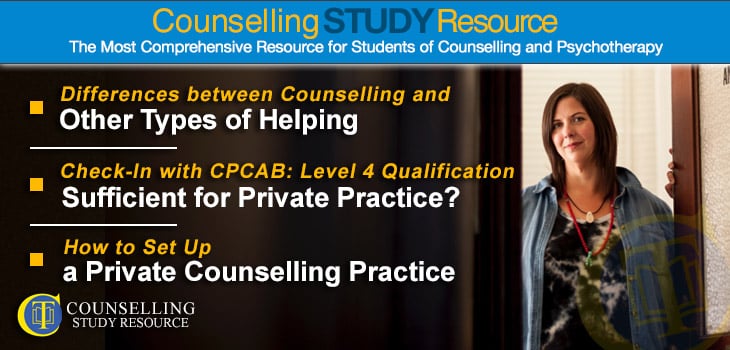125 – How to Set Up a Private Counselling Practice
Differences between Counselling and Other Types of Helping – Is a Level 4 Qualification Sufficient for Entering Private Practice?
In episode 125 of the Counselling Tutor Podcast, Ken Kelly and Rory Lees-Oakes discuss the differences between counselling and using counselling skills. ‘Check-In with CPCAB’ then looks at whether a Level 4 counselling qualification is enough for setting up in private practice. Finally, the presenters explore how to set up a private counselling practice. They discuss what you will need to consider if you do decide at some stage to become a private-practice counsellor.
Differences between Counselling and Other Helping Professions (starts at 3.15 mins)
Not everyone who comes on Level 2 and Level 3 counselling courses wants to be a qualified counsellor. (These levels relate to the National Qualifications Framework for England, Wales and Northern Ireland – the Scottish system is different.)
Indeed, counselling skills are useful in many different professions, for example social care, health care, probation services and chaplaincy.
How counselling differs from other types of helping is a regular topic on counselling courses, appearing often in exams and assignments, especially at Level 2.
It can be very challenging for people who are used to helping in very different ways to become accustomed to helping in a counselling way.
For example, many helping professions may have a ‘fixing’ role, focused on solving the person’s problems for them.
It is a huge change for those used to this mode of helping to understand that in counselling, the client has autonomy and responsibility for finding their own way of moving forward, with the therapist supporting them in this but specifically not offering advice.
It would be unethical for another helping professional who is not a qualified counsellor to start a counselling process with a client, as there would not be a counselling contract in place, with a planned course of sessions to complete this process.
All qualified counsellors work within the ethical framework of their professional body; this is vital to the provision of an ethical counselling service.
In short, counselling courses at Level 2 and Level 3 are ‘CV gold’ in terms of the sought-after communication and listening skills they teach you – but it’s vital to know your limits.
Rory has written a handout entitled ‘What Is Counselling?’. You can download this free of charge here; it is also available through the Handouts Vault and Counselling Study Resource (CSR).
Check-In with CPCAB: Is a Level 4 Qualification Sufficient for Entering Private Practice? (starts at 13.45 mins)
Rory speaks to Kelly Budd (Head of Qualifications) about whether a Level 4 qualification is sufficient for entering private practice. This topic is one that arises often on the Counselling Tutor Facebook page.
She explains that in fact counselling is currently an unregulated profession in this country, meaning that anyone can – in theory – set themselves up as a private counsellor, though this would of course be unethical without the right qualifications and experiences.
While technically there is nothing to stop a newly qualified Level 4 counsellor from setting up in private practice, Kelly highlights the additional demands and challenges that this presents over and above working in an agency setting.
- For example, in an agency, a senior counsellor may well assess all new referrals and triage them appropriately, allocating any more complex cases to more experienced counsellors.
In private practice, however, you will have to assess all new clients yourself, and may be faced with significant complexity and risk. There is a huge amount of learning in agency working.
- Also, a private practice is a business, so running a successful one is not just about being a great counsellor – you also have to have knowledge and skills in business management.
There are lots of different considerations, including data protection, finance and taxes, and making sure you have all the necessary policies and procedures in place. In an agency setting, all this is done for you.
- Last but not least, agencies tend to provide counselling free of charge or at low cost to clients who might not otherwise be able to afford private counselling.
This enables counsellors there to practise the social inclusion that might well have been part of what attracted them into the profession originally.
In conclusion, while private practice can be an exciting and valuable area in its own right, it’s wisest not to rush into it, instead waiting for the right time for you in terms of experience and training.
CPCAB offers Level 5 courses to help counsellors who wish to enter private practice gain the skills and underpinning knowledge they will need.
For more information, please see CPCAB’s website. CPCAB is the UK’s only awarding body run by counsellors for counsellors.
How to Set Up a Private Counselling Practice and What to Consider (starts at 37.55 mins)
Ken and Rory go on to explore how to set up a private counselling practice and the various areas you’ll need to consider.
While they don’t wish to deter people from this route, they do caution strongly against assuming you have the knowledge and skills to operate ethically and financially effectively without serious thought and preparation.
Key skills you will need to succeed in private practice that you may not already have been trained in or exposed to are:
- assessing the full range of client presentations (including the use of assessment tools, e.g. CORE-10 and CORE-34, and looking at risk)
- setting up and running a business.
The CSR includes a specially designed mini-course on the business aspects of how to set up a private counselling practice, with modules covering the full range of skills you’ll need to succeed, from building a website and designing marketing material to taking payment from clients.
Free Handout Download
What is Counselling?
